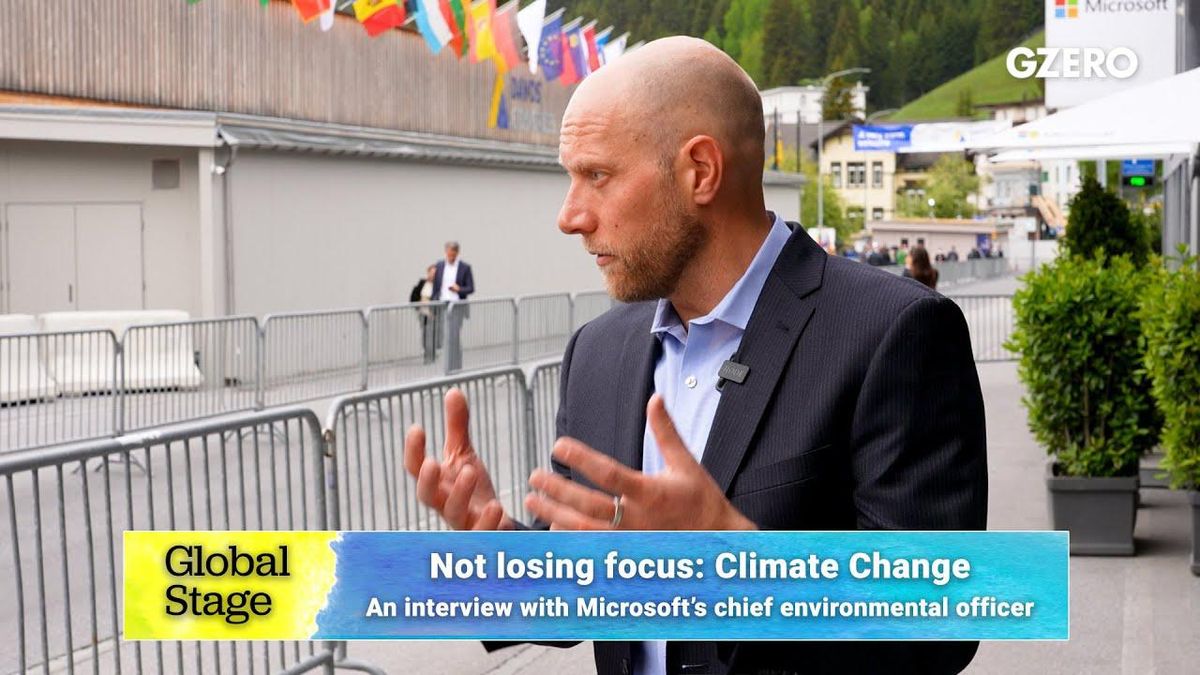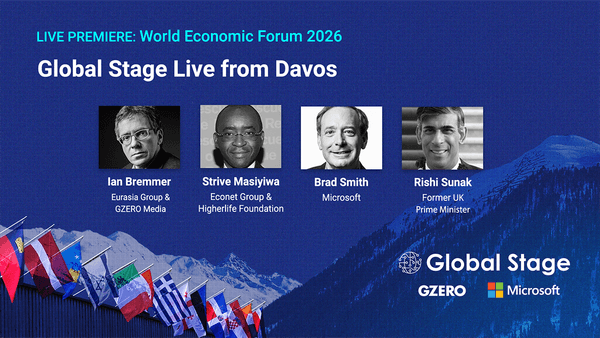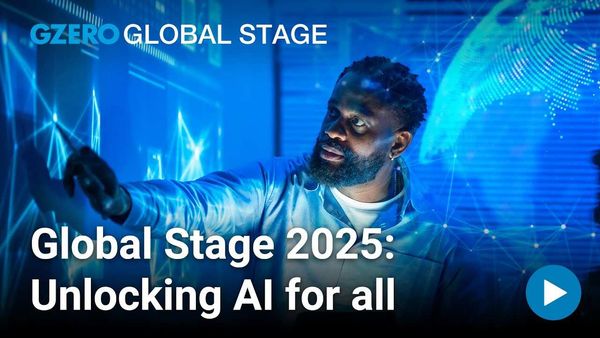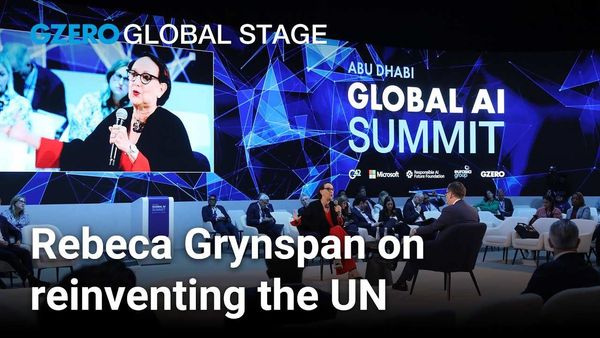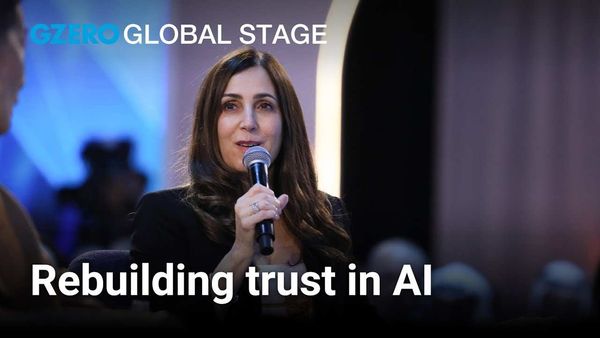GZERO Media caught up with Microsoft's Chief Environmental Officer Lucas Joppa at the World Economic Forum in Davos to discuss ways to keep nations focused on climate change amid the converging crises of war and pandemic.
Tony Maciulis: When you have these very immediate and acute crises happening concurrently like pandemic and now of course the war in Ukraine, has it been a challenge to keep the focus on climate change?
Lucas Joppa: I would say yes and no. It's a challenge because obviously these are crises in and of themselves and they need to be dealt with and focused on. But on the other hand, I think that these crises, what they've done is they've really shown society that we have things that are going to happen to us. And if we know that they are coming, it would behoove us to do something about them now to prepare for it now. The biggest thing that we have coming for us is the impacts of a rapidly changing global climate system. It's front and center of our minds. We know we have to get out and do something about it. And so on the one hand, yes, we're focusing on these crises, but it hasn't shifted focus off of climate either.
Tony Maciulis: One thing that the war in Ukraine has certainly done is make some countries like Lithuania, for example, rethink their dependence on Russian gas. To what extent do you think the war has an opportunity to change the way countries think about energy in general? And will it in some way hasten a shift toward alternative energies?
Lucas Joppa: Well, it's really put everybody's thinking about the energy transition in hyperdrive. It has forced people to start thinking about the future of energy in a way that they hadn't had to before. We are at a critical juncture where people can choose a more clean, just, equitable future from an energy perspective or double down on the energy sources of the past. I think we know what a mistake that latter option would be. And so I'm just really excited about the fact that people are getting out there really thinking through and starting to put in place the infrastructure investments that they're going to need to pull off that net zero carbon transition.
Tony Maciulis: We last spoke to you, of course, in Glasgow for COP26. That's more than six months ago. What kind of progress has been made since then? And are you optimistic that by the time we get to Sharm el-Sheikh, there'll be something tangible to show?
Lucas Joppa: Well, I think that the world has been occupied with dealing with some of these crises that are in front of them. But I think that, especially with the energy crisis in Europe, there is actually a lot of progress, a lot of unexpected progress in a clean energy transition. And so that's fantastic. I think as we go from Scotland to Egypt, from COP26 to COP27, you're going to see a significant shift from not just focusing on mitigation from a climate perspective, but also adaptation and helping to build a more just and equitable future. And so I think that that's going to be an incredibly important addition to the conversation that the world's been having over the past decade or so.
Tony Maciulis: When you say adaptation, explain what that means exactly.
Lucas Joppa: Well, adaptation simply recognizes that climate change isn't something that's going to happen into the future. Climate change is something that's already happening today. And no matter how quickly we achieve a net zero economy, there are going to be human impacts of climate that have changed. And so we need to be able to help people adapt to that. We need to be able to shift our energy, our agriculture, and our other socioeconomic systems to help people adjust to the changing climates that we know are going to come. Whether that's a 1.5 degree celsius temperature increase, a two degree celsius increase, or something in between. We know that that temperature increase is going to lead to changes for human society and it behooves us to start focusing now on how we're going to help people adjust to those climactic changes.
Tony Maciulis: So one thing that you hear as a solution out there when it comes to adaptation is, okay, the temperatures are getting hotter. So we have to rely on more coolants, more air conditioning, right? How do you adapt to climate change without creating a bigger carbon emission problem?
Lucas Joppa: Well, that is the question. You can either adapt to climate change by making it worse or you can adapt to climate change by making it better. I mean, even if you just think about the built environment, the built environment is one of the largest sources of emissions across all sectors. And why is that? Well, it's because we've never been all that efficient with the way that we build, the way that we design, site, build, and then operate these buildings all around us. And so we know there are incredibly simple things, whether it's just the directional facing that we put buildings, the insulation and the energy efficiency that we build into these buildings. I think all of that is stuff that we can start doing now. It's not rocket science. We've known how to do it. But really it just sharpens the focus on making sure that all of this is coming together in a way that, as you said, adapts people to the changing climates, but does so in a way that also hastens our net zero transition as opposed to postpones it.
Tony Maciulis: And finally, here we are in Davos as the world economic forum is now in day two. Obviously climate and energy are on the agenda, but what are you hoping to hear and see? And what do you think would be a great result to have come out of this?
Lucas Joppa: Well, I think, A, it's fantastic to see that climate and sustainability remains as a top priority on the world economic forum agenda. That's fantastic. And now we really need to see the organizations, whether that's public, private sector that are here really start moving the conversation from pledges, which was really a focus of Davos in 2020, people pledging the progress that they were going to make. We need to move from the pledges to actually the progress that we need to make. And so seeing people really doubling down on their commitments, seeing people really doubling down on operationalizing and executing against their commitments, that's going to be critical.


